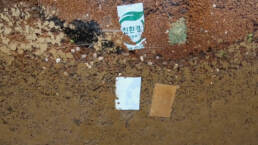DAY1LAB STORY
Technology for the coexisting worldbetween human beings and the environments
ENVIROMENT*HUMAN
Connecting people and environments
Under the vision of “creating sustainable convenience”,
we developed and commercialized a material that is innocuous to the environment and human beings.
We perform as a link for the world where environments and human beings can coexist.
TECHNOLOGY*EVERYDAY LIFE
Changing daily life with our technology.
DAY1LAB has professional materials-production technologies which are innocuous to nature.
We innovate our everyday life with a plastic alternative material free from microplastic generation and greenhouse gas emissions.
We promise an unchanging daily life where people can consume freely and nature can retain its beauty via our technology.
Creating Sustainable Convenience
Plastic threats
Annually, 2.7 billion tons of plastic products are produced and consumed due to the easy manufacturing process.
End-of-life plastic products are bringing critical ecological issues because abandoned non-degradable plastics in soil and ocean work as a source of microplastic. In particular, microplastics affect the bloodstream and lymphatic system within the human body and threaten the health of human beings.
Soil and Marine Plastic Waste
Non-degradable plastic wastes in the soil and ocean
release harmful substances and pollute the soil and ocean.
8,000,000
해양유출 플라스틱 폐기물량 (ton) | Out World in Data
Microplastic
Refers to plastic particles having a diameter of 1μm (micrometer/millionth of a meter) to 5mm. Tiny microplastic is created by weathering or solar decomposition of bigger plastic chunk.
2,000
1주일간 미세 플라스틱 섭취량 (개) | WWF
Carbon Emissions
Hazardous materials and greenhouse gases are generated during the production, consumption, and disposal of plastics.
1,670,000,000
플라스틱 탄소 배출량 (ton) | Nature Climate Change
DAY1LAB’s solution
Degradation test
Innocean constituted of natural carbohydrates polymers and proteins has excellent decomposability without generating microplastics and substitutes existing fossil fuel-derived plastics.



